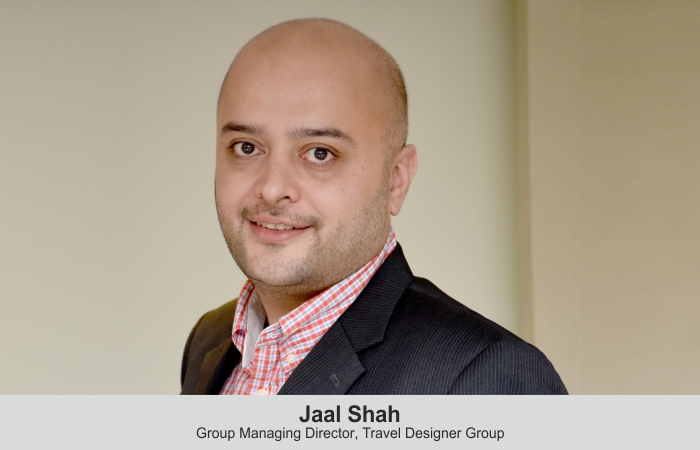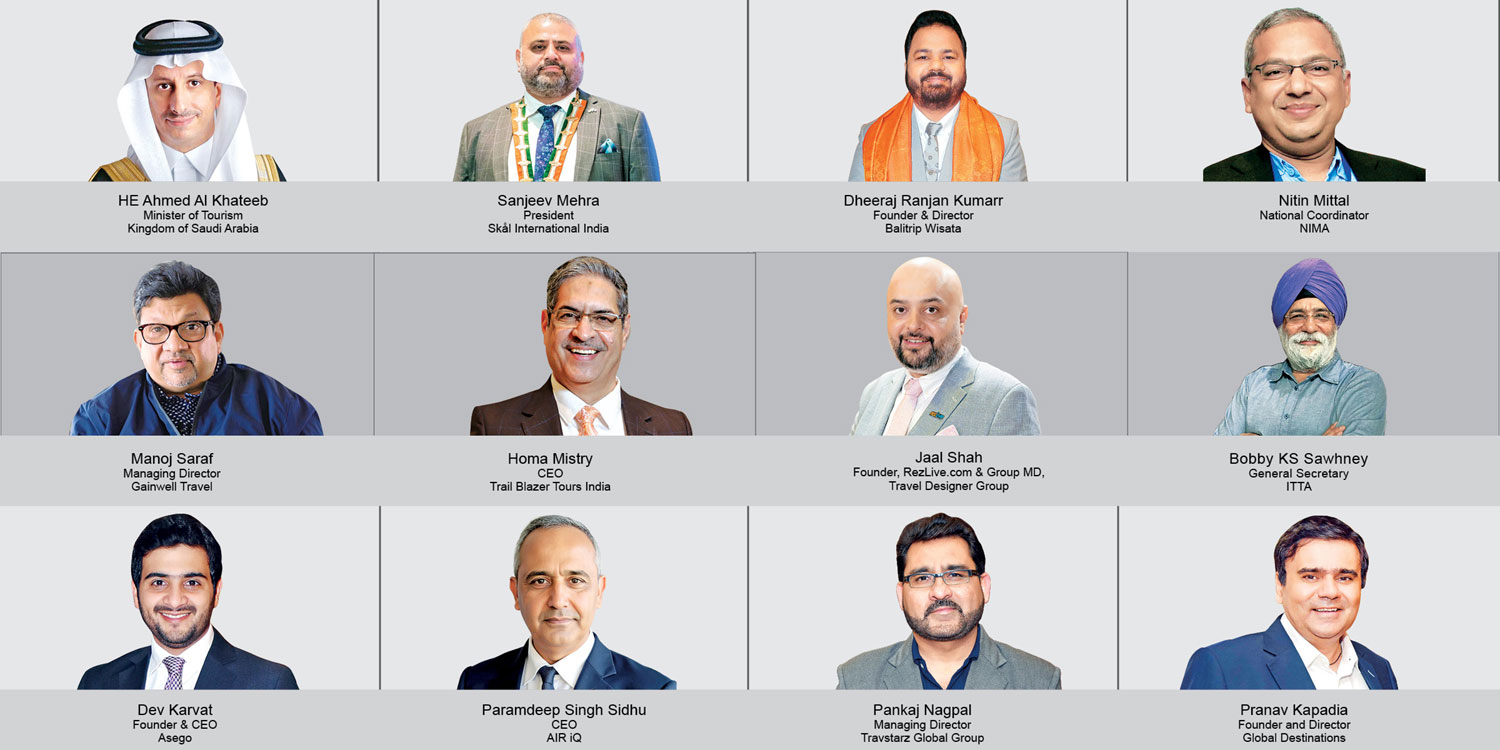Jaal Shah, Group Managing Director, Travel Designer Group, claims that a positive outlook and a clear strategy towards recovery helped them deal with the impact of the COVID-19 pandemic head-on. Now, with green shoots in business in some of the markets that they operate in, they are looking ahead to recovering some more in the months to come.
Nisha Verma
Q What were the main issues you faced during the lockdown and what kind of impact has Travel Designer Group seen on its business?
The travel industry has been one of the heavily impacted industries during the COVID-19 pandemic and Travel Designer Group is not immune. As an organisation, we went through one of the most challenging times throughout our existence since 1999. Fortunately for us, we started tracking the developments of COVID-19 as early as January. When some parts of the world started going into lockdown, we started preparing, in early March, for a similar scenario in the countries where we operate. This ensured that we did not face any major issues to our operations and helped us to settle seamlessly to work from home.
I think the business impact is like all other organisations in the industry. The main characteristic of this pandemic is the steep fall in business starting mid-March. The drop was sudden, and no one could have done anything, considering that it was induced by government-led travel restrictions around the world. With leisure, business and M!CE restricted, the only business left was from stranded travellers and quarantine requirements. It is all behind us now and we are seeing green shoots in some of our major markets. We should see more recovery in the coming months.
Q What steps have you taken to sail through the pandemic?
Travel Designer Group was founded based on strong financial fundamentals and we had been profitable since inception. Further, over the last two years, we analysed all risks associated with our business model, such as currency exchange, credit and business disruptions, and strategically worked on strengthening our organisation on all these aspects. These efforts paid off during the pandemic. As I mentioned earlier, we tracked the pandemic right from its early stages and had plans for different scenarios. Hence, when the lockdown began, we never had a moment of indecisiveness.
I would classify our pandemic response into four stages:
Rest: The entire senior management took a few days break during the initial phase of lockdown to introspect on how we will handle the pandemic.
Refund: Our first goal wasto refund travel agents in their original mode of payment, and we were clear that we will not issue credit notes. Fortunately, many of our supplier partners stepped-up and announced force majeure.This helped in quick resolution of reservations affected by COVID-19.
As we speak, we have refunded all the affected reservations and our client feedback is testimony to our efforts.
Restructure: In my assessment, I think the earlier expectation of a V-shaped recovery is no more realistic. Looking at the modest rebound in some of the markets where business is opened to near normal, I think that the recovery will be steady but slow and it will be at least a year and a half to two years before we can rebound to 2019 levels. With that assessment, we also had to restructure our organisation setup to reduce our cost, align it to current business levels, and strengthen it for sustainable business. We had to take some tough decisions and let go of some wonderful talent we had. However, we ensured that we were transparent right from the start and tried to minimise the impact in all possible ways.
Rebound: This is where we are now. In the last two months, we worked on every little feedback that we received from our clients about our product to bring many new innovative features that made our platform more robust and user-friendly. Our sales team across all markets is working closely with clients, educating them about possible travel trends post-COVID and how we can together emerge with a sustainable business model.
Q What do you think is the future for outbound travel from India in the short term?
I think that it will be another two to three months before we can see recovery in outbound tourism from India. Currently, there are lot of restrictions on Indian travellers. We have established travel bubbles to several European countries for essential travel and movement of residents, but not for tourists. Only after these restrictions are removed, we can get a fair sense of recovery.
IPL 2020 could be a litmus test. UAE has opened its borders for Indian tourists, and the cricket board is mulling allowing spectators. That will be an excellent opportunity and could spark outbound travel from India.
Q With limited outbound travel, do you think Indian domestic tourism could become a better revenue earner?
Traditionally, domestic tourism takes a significant chunk in travel spending of Indians. In the initial phase of COVID-19 with international borders closed, we anticipated domestic tourism to multiply. Unfortunately, the inter-state restrictions did not allow tourism at all. Since August, we are seeing significant movement in domestic tourism. This will partially substitute business lost in outbound tourism.
Globally, we are seeing some support from governments to encourage domestic tourism. Such measures would encourage tourists to take more domestic vacations post-COVID as well. We have not seen any tourism sector-specific relief measures from the Indian government. It will be of great help if the government could intervene.
Q Do you think travellers’ requirements will be different now?
Safety and hygiene will become a key point. Recently, we reached out to a number of hotel chains, stand-alone hotels and attractions to gather information about their safety and hygiene practices during this time and we were heartened to know that a lot of thought and effort had gone into making guests feel safe and comfortable. Cleaning procedures, social distancing and contactless service have taken centre stage. This might also prompt guests to choose well-known brands, where they can feel comfortable. We can also expect many safety precautions followed by airlines and airports to become a norm post COVID.
Q When, according to you, would tourism bounce back?
This depends on multiple factors. First, international borders must open and then the restrictions related to COVID testing and self-isolation must be relaxed for leisure travellers to comfortably take vacations. Availability of a vaccine would remove these pain points.
Then, it is down to economic conditions and disposable income of people. Global economy is expected to shrink this year and would most likely recover over the next two years. Tourism will also recover steadily, and I am confident that we can see pre-pandemic levels in a year to year and a half.
About RezLive.com
Launched in 2007 in India, RezLive.com is the flagship product of Travel Designer Group and is one of the largest and fastest-growing online B2B travel portals in the Middle East, South Asia and Southeast Asia.
Keeping guests confident
“Looking back, we are quite happy with what we have achieved in the last few months. We launched REZ2020 and redesigned RezLive.com booking engine to suit the new-age requirements. Our operations and accounts team worked tirelessly to refund all COVID-affected reservations to our clients in their original mode of payment. Our sales team engaged with each one of our clients, updating them about COVID impacts, travel advisories, health and safety precautions by hotels and attractions, and new product updates from RezLive.com. Personally, I spoke with over 400 clients globally via video conferencing to thank them and to learn about their post-COVID business expectations and how we could work together to emerge stronger. I intend to reach out to more clients in the coming weeks.”
Learnings from a pandemic
“The biggest learning, I would say, is the revelation that the world can throw challenges at our business any time and it is important for us to be prepared for any situation. Our response to these challenges depends on the strength of business fundamentals on which an organisation is found. Staying focused on these fundamentals, optimising and maximising the available resources, and setting up a high-performance, customer-centric work culture is essential to mitigate such challenges. With a smaller market size, innovation, proactivity and customer focus are going to be critical to retain market share.”
 TravTalk India Online Magazine
TravTalk India Online Magazine





